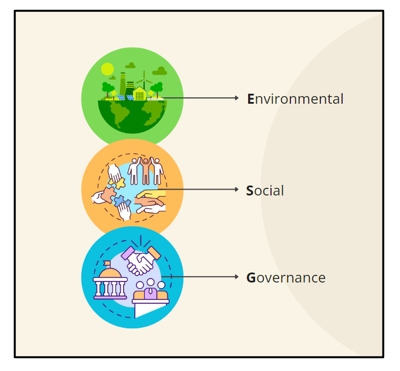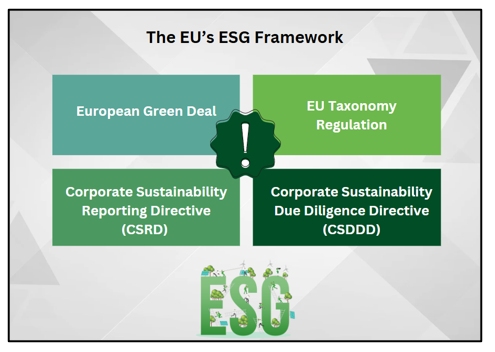- within Corporate/Commercial Law topic(s)
- in United Kingdom
- in United Kingdom
- with readers working within the Media & Information and Retail & Leisure industries
- within Energy and Natural Resources, Tax and International Law topic(s)
ESG ("ESG") standards are at the forefront of global business priorities, reshaping how companies operate and strategize for the future. As environmental challenges worsen and societal demands grow, adopting strong ESG practices is now crucial for business compliance, fostering innovation, and securing competitive advantages. The European Union ("EU") has established itself as a global leader in ESG regulation through a comprehensive legal framework. Meanwhile, Türkiye, while still developing its regulatory approach, demonstrates an increasing commitment to aligning with global ESG standards.

This article examines the similarities, differences, and business implications of the ESG frameworks in the EU and Türkiye, providing a comparative perspective on how these systems address sustainability challenges.
The EU: A Pioneer in ESG Regulation
The EU's approach to ESG is characterized by its ambitious objectives, stringent requirements, and far-reaching implications for businesses operating within or interacting with its jurisdiction. The foundation of the EU's ESG framework is the European Green Deal, an overarching policy initiative aimed at achieving climate neutrality by 20501. The EU has enacted regulations designed to enhance transparency, accountability, and sustainability across industries to operationalize these goals.
One of the most notable aspects of the EU's ESG regulatory framework is the EU Taxonomy Regulation2. A cornerstone of the EU's sustainable finance framework. This regulation provides a classification system for determining the environmental sustainability of economic activities. It defines criteria for activities aligned with climate change mitigation, climate adaptation, pollution prevention, circular economy transition, and biodiversity preservation. Accordingly, the Taxonomy is critical in directing investments toward projects that contribute to the European Green Deal objectives and combat greenwashing by setting transparent standards.
Additionally, the Corporate Sustainability Reporting Directive ("CSRD") Mandates large companies, including non-EU firms with significant operations in the EU, to report their sustainability performance based on standardized metrics3. The CSRD aims to increase transparency and comparability of ESG data by requiring disclosures aligned with the European Sustainability Reporting Standards ("ESRS"). Companies must report on various topics, including climate risks, biodiversity impacts, and social equity measures.

Complementing these measures is the Corporate Sustainability Due Diligence Directive ("CSDDD"), which imposes due diligence obligations on companies to identify, mitigate, and address adverse environmental and human rights impacts throughout their value chains4. The directive applies to large EU and non-EU firms with significant economic activity in the EU. It requires businesses to integrate sustainability into their corporate policies, monitor supplier practices, and adopt credible transition plans to limit global warming to 1.5°C.
Key Features of the EU ESG Framework
The EU Taxonomy Regulation, CSRD, and CSDDD collectively create a robust and interdependent framework that underpins the EU's leadership in sustainability. The Taxonomy Regulation serves as the foundation by defining clear criteria for environmentally sustainable economic activities, enabling investors and businesses to identify and prioritize actions that align with key climate and environmental objectives. Building on this classification, the CSRD establishes stringent reporting requirements for large companies, including non-EU firms with substantial EU operations, to disclose their ESG performance in a standardized and transparent manner through the European Sustainability Reporting Standards. It ensures comparability, accountability, and the availability of reliable data for stakeholders.
Complementing these measures, the CSDDD mandates companies to conduct due diligence across their value chains, identifying, mitigating, and addressing adverse environmental and human rights impacts. It also requires adopting transition plans to align business models with global warming limits of 1.5°C. Together, these regulations create a comprehensive ecosystem that integrates sustainability into corporate strategies, ensures transparency, and promotes ethical practices throughout global supply chains, collectively advancing the EU's Green Deal objectives and combating greenwashing.
Business Implications of the EU Framework
Compliance with the EU's ESG regulations entails challenges and opportunities for businesses. Accordingly, companies must invest in robust reporting mechanisms, data collection systems, and risk management processes to meet regulatory requirements. These adjustments often require significant financial and operational resources, particularly for small and medium-sized enterprises ("SMEs"). On the other hand, businesses that successfully align with the EU's ESG standards gain access to a range of benefits, including improved investor confidence, enhanced access to sustainable financing, and a competitive edge in environmentally conscious markets.
Moreover, the EU's emphasis on transparency and accountability fosters greater trust among consumers, investors, and other stakeholders. Companies that demonstrate a genuine commitment to ESG principles are more likely to attract ethical investments, secure favorable financing conditions, and strengthen their reputations in a rapidly evolving business landscape.
Simplifying ESG Reporting: The EU's Plan to Reduce Complexity and Boost Competitiveness
The EU has announced a bold initiative to consolidate its ESG reporting obligations into a single regulation, aiming to simplify the framework and enhance competitiveness. Announced by European Commission ("EC") President Ursula von der Leyen, following the Budapest Declaration, this effort reflects the EU's commitment to a "simplification revolution." By integrating the CSRD, EU Taxonomy, and CSDDD into a unified framework, the EC seeks to reduce administrative burdens while retaining the substantive requirements of these regulations.
The initiative aligns with the Council's call to cut reporting obligations by 25% by mid-2025, emphasizing efficiency and practicality. This reform draws from Draghi's "Future of European Competitiveness" report, advocating for competitiveness testing of new proposals to assess cumulative impacts, compliance costs, and administrative burdens. President Ursula von der Leyen highlighted the plan as a key step to boost cross-border trade, foster innovation, and attract investment. While specifics remain under development, businesses view this consolidation as a welcome move to clarify and streamline overlapping ESG requirements, reinforcing the EU's sustainability agenda.
Türkiye: An Emerging ESG Framework
Türkiye's ESG framework is still in its developmental stages, reflecting a gradual transition toward a comprehensive and structured approach. Türkiye's commitment to sustainability is evident in its ratification of the Paris Agreement and the development of the Green Deal Action Plan, which outlines strategic priorities for achieving a low-carbon economy. While Türkiye does not yet have a binding ESG regulatory framework comparable to the EU, significant progress has been made through key legislative and sector-specific initiatives.
First of all, with the amendment made to the Turkish Commercial Code in 2022, the Public Oversight, Accounting, and Auditing Standards Authority ("KGK") has been authorized to establish and publish the Türkiye Sustainability Reporting Standards in compliance with international standards. This aims to ensure consistency in practice and international recognition of sustainability-related reporting for designated enterprises and institutions. The KGK has based these standards on the IFRS Sustainability Disclosure Standards published by the International Sustainability Standards Board (ISSB) and has issued the Sustainability Reporting Standards (TSRS: TSRS 1 and TSRS 2). These standards make environmental, social, and economic sustainability reporting mandatory for companies that meet certain criteria. The primary objective of the TSRS is to ensure transparency in companies' sustainability performance, facilitate access to green financing, and enhance competitiveness in the international arena.
The KGK has determined the companies subject to mandatory sustainability reporting through its Board Decision ("Decision") on the Scope of Implementation of Türkiye Sustainability Reporting Standards. The companies specified in the Decision are as follows:
- Companies subject to the regulation and supervision of the Capital Markets Board under Law No. 6362
- Enterprises subject to the regulation and supervision of the Banking Regulation and Supervision Agency under Law No. 5411
- Insurance, reinsurance, and pension companies operating under the Insurance Law No. 5684 and the Private Pension Savings and Investment System Law No. 4632
- Authorized institutions, precious metals brokerage firms, and companies engaged in the production or trade of precious metals, permitted to operate in Borsa Istanbul Markets
Companies not listed above are not obligated to prepare sustainability reports under the Decision. However, companies that are not subject to this obligation may voluntarily prepare such reports.
For companies among those listed above, excluding banks subject to the supervision of the Banking Regulation and Supervision Agency ("BDDK"), the obligation to conduct sustainability reporting arises only if they exceed at least two of the following threshold criteria in two consecutive reporting periods:
- Total assets of 500 million Turkish Lira
- Annual net sales revenue of 1 billion Turkish Lira
- 250 employees
Additionally, under the Decision, banks subject to the supervision of the BDDK but not under the Savings Deposit Insurance Fund ("TMSF") are required to conduct sustainability reporting without being subject to any threshold criteria.
On the other hand, recently published the Sustainability Audit Regulation, introduces a comprehensive framework for conducting sustainability audits in Türkiye. The regulation sets out procedures and principles for the auditing of sustainability reports in compliance with the Türkiye Sustainability Reporting Standards (TSRS). It defines the roles, responsibilities, and certification requirements for independent audit firms and auditors engaged in sustainability-related activities. Additionally, it mandates evaluating sustainability reports to ensure their accuracy and alignment with TSRS, fostering greater transparency and accountability in corporate ESG practices. This regulation represents a significant step towards aligning Türkiye's sustainability practices with international standards.
Türkiye's environmental commitments are further strengthened by the Draft Climate Act, which aligns national policies with international goals, such as the EU's target of net-zero emissions by 2050. The Draft Act5 emphasizes emission reductions, renewable energy expansion, circular economy practices, and sustainable urban development. Complementing this, the draft Carbon Market Regulation, lays the groundwork for a robust carbon trading system, incentivizing companies to reduce their carbon footprints. Additionally, compliance with the Carbon Border Adjustment Mechanism ("CBAM") has become essential for companies exporting to the EU, requiring rigorous carbon footprint reporting to mitigate the impact of potential carbon taxes.
Sector-specific initiatives also play a crucial role in Türkiye's ESG progress. The Banking Regulation and Supervision Agency has integrated ESG principles into financial practices through its Sustainable Banking Strategic Plan, encouraging banks to manage environmental and social risks effectively. Similarly, the Capital Markets Board ("CMB") has introduced the "Green Bond, Sustainable Bond, Green Lease Certificate, and Sustainable Lease Certificate Guide", which promotes green financing by offering incentives such as a 50% reduction in board fees for green securities issuance. These instruments enable businesses to fund environmentally friendly projects, contributing to Türkiye's broader sustainability goals.
Despite these advancements, challenges persist. Türkiye's ESG regulations remain fragmented, with environmental, social, and governance principles governed by various decrees and policies. Economic barriers, particularly for small and medium-sized enterprises, and the prevalence of greenwashing, where companies falsely claim environmental compliance, highlight the need for stricter oversight and enforcement.
Türkiye's ESG framework is evolving rapidly, with milestones like the Sustainability Audit Regulation, Draft Climate Act, and sectoral initiatives demonstrating significant progress. However, further efforts are needed to harmonize regulations, support businesses in achieving compliance, and raise awareness of ESG's long-term benefits. By aligning with global standards and addressing these challenges, Türkiye can enhance its economic resilience, attract foreign investment, and pave the way for a sustainable and inclusive future.
Comparative Analysis
The ESG frameworks of the EU and Türkiye exhibit several key differences in their regulatory scope, enforceability, and business implications. The EU's approach is defined by its comprehensive and binding nature, with clear compliance mechanisms and strict reporting requirements. In contrast, Türkiye's framework is characterized by a mix of mandatory and voluntary elements, with sector-specific obligations for certain businesses and a general emphasis on encouraging alignment with international standards. One significant distinction lies in the regulatory scope of ESG obligations. The EU's regulations, such as the CSRD and CSDDD, impose specific requirements on companies operating within or engaging with the EU market, regardless of their geographic origin. These obligations often extend to non-EU firms with substantial economic activities in the region, underscoring the extraterritorial reach of the EU's ESG framework.
Specifically, regulations such as the Corporate Sustainability Reporting Directive (CSRD) and the Corporate Sustainability Due Diligence Directive (CSDDD) apply to non-EU companies if they meet certain criteria. For example, under the CSRD, non-EU firms are subject to reporting obligations if they generate net revenues exceeding €150 million within the EU and have either a subsidiary or branch in an EU member state meeting specific threshold. Similarly, the CSDDD applies to non-EU companies if their annual net turnover in the EU exceeds €40 million or €150 million, depending on the sector, and they engage in significant operations within the EU. These conditions highlight the EU's focus on ensuring that businesses benefiting from its market comply with its sustainability standards, regardless of geographical location. In Türkiye, most ESG-related measures are voluntary or sector-specific, emphasizing fostering awareness and encouraging proactive adoption of sustainable practices. For instance, under the Capital Markets Board's (SPK) regulations, companies exceeding certain thresholds must adhere to the Green Bond, Sustainable Bond, Green Lease Certificate, and Sustainable Lease Certificate Guide, ensuring alignment with environmental sustainability standards.
Another notable difference is the level of regulatory maturity. The EU's ESG framework is supported by well-defined guidelines, timelines, and enforcement mechanisms, providing businesses with clear expectations and robust accountability measures. In Türkiye, while introducing the Sustainability Audit Regulation represents a positive step toward regulatory development, it reflects the early stages of establishing a cohesive ESG framework. Efforts such as the SPK's mandatory obligations for certain companies signify progress, particularly in fostering transparency and supporting sustainable financing practices. However, these initiatives remain relatively nascent and demonstrate that Türkiye is still catching up with the EU's comprehensive and binding ESG landscape.
Opportunities for Businesses
Despite these differences, businesses in both regions can benefit from proactive engagement with ESG principles. In the EU, companies that align with ESG regulations gain access to sustainable finance, enhanced market trust, and opportunities to innovate in response to regulatory requirements. In Türkiye, businesses that voluntarily adopt ESG best practices can position themselves as leaders in sustainability, improving their competitiveness in global markets and attracting environmentally conscious investors. Also, companies should take prior action on whether they have obligations under the current legislation and then take the necessary steps to comply with the latest legislation, especially the Sustainability Audit Regulation.
Furthermore, Turkish companies with cross-border operations or partnerships in the EU have a strong strategic imperative to align with EU ESG standards. Given the extraterritorial nature of frameworks like the CSRD and CSDDD, non-compliance can result in restricted market access, reputational risks, and potential financial penalties. By proactively aligning with EU ESG regulations, Turkish businesses can streamline their compliance processes, reduce the risk of operational disruptions due to regulatory scrutiny, and better navigate the increasingly stringent expectations of international partners and investors.
Moreover, adherence to EU standards ensures compliance readiness and reinforces Turkish companies' perception as responsible and forward-thinking players in global markets. This alignment can significantly enhance their positioning within supply chains, particularly with European counterparts who prioritize sustainability in procurement and partnerships. In doing so, Turkish companies can strengthen their competitive edge, attract sustainable investments, and foster long-term resilience in an increasingly ESG-focused global economy.
Conclusion
The EU andTürkiye's ESG frameworksreflect different stages of development and regulatory focus, but both underscore the growing importance of sustainability in the global business landscape. For businesses, understanding and navigating these frameworks is not merely a matter of compliance but a strategic imperative for achieving long-term growth and resilience.
With its mature and binding ESG framework, the EU continues to lead with well-defined obligations and robust enforcement mechanisms. Recent initiatives, such as Ursula von der Leyen's call for a "simplification revolution" during the Budapest Declaration, highlight the EU's dedication to refining and streamlining its regulatory framework while maintaining its high standards of sustainability and accountability.
In Türkiye, while the ESG framework is still in its formative stages, introducing measures like the Sustainability Audit Regulation and sector-specific obligations demonstrates meaningful progress toward regulatory maturity. However, significant room remains for further clarity, harmonization, and alignment with global standards to enhance businesses' ability to compete internationally.
Footnotes
1. European Commission, The European Green Deal, COM(2019) 640 final, 11 December 2019. Available at: https://eur-lex.europa.eu/legal-content/EN/TXT/?uri=CELEX%3A52019DC0640, Last accessed: 10.02.2025
2. European Parliament and Council, Regulation (EU) 2020/852 on the Establishment of a Framework to Facilitate Sustainable Investment (EU Taxonomy Regulation), OJ L 198, 22.6.2020, pp. 13–43. Available at: https://eur-lex.europa.eu/legal-content/EN/TXT/?uri=CELEX:32020R0852, Last accessed: 10.02.2025
3. European Parliament and Council, Directive (EU) 2022/2464 on Corporate Sustainability Reporting (Corporate Sustainability Reporting Directive - CSRD), OJ L 322, 16 December 2022, https://eur-lex.europa.eu/legal-content/EN/TXT/?uri=CELEX:32022L2464, Last Accessed: 10.02.2025.
4. European Parliament and Council, Proposal for a Directive on Corporate Sustainability Due Diligence (Corporate Sustainability Due Diligence Directive - CSDDD), COM (2022) 71 final, 23 February 2022. Available at: https://eur-lex.europa.eu/legal-content/EN/TXT/?uri=CELEX:52022PC0071, Last Accessed: 10.02.2025.
5. Republic of Türkiye, Draft Climate Act, Ministry of Environment, Urbanization and Climate Change, Available at: https://www.baib.gov.tr/files/downloads/PageFiles/f345dbce-f055-ed11-a91b-000c29511bae/Files/ek-3.pdf, Last Accessed: 10.02.2025.
The content of this article is intended to provide a general guide to the subject matter. Specialist advice should be sought about your specific circumstances.



